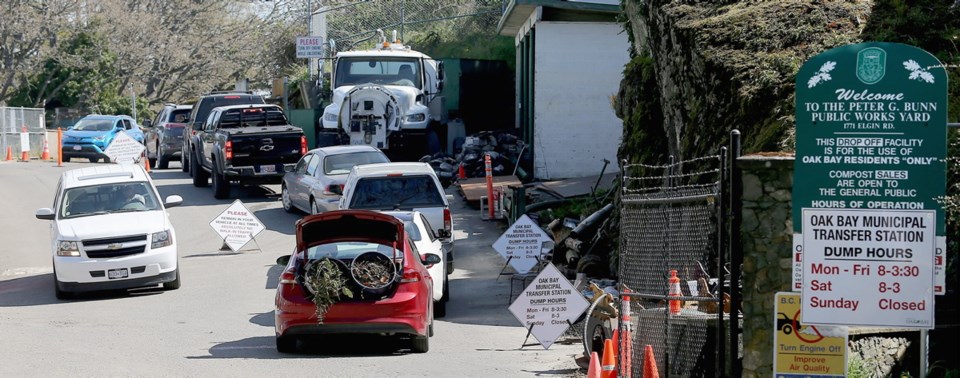Service organizations that depend on donations of household items are asking the public to hold on just a little longer to all those items normally donated as part of spring cleaning or decluttering the house.
Many people confined to their homes due to the COVID-19 outbreak are taking the opportunity to clean out their closets and garages. But there are few options for getting rid of anything that’s no longer wanted.
Garage sales have all but evaporated, and people are hesitant to even buy and sell online. And thrift stores, a primary destination for discarded items, are also closed.
Mabel Marin, marketing and communications for the Women in Need Community Co-operative, is urging people to hang onto those unwanted items until the outbreak is over.
“We know it is an inconvenience for our donors to keep the items, but please set it aside,” Marin said. “We will need them more than ever when we re-open.”
The organization, which provides crisis and other services to women in need, gets much of its funding from the sale of donated clothing, household items and furniture through five retail resale stores in Victoria and Langford.
With brick-and-mortar locations closed, WIN recently launched an online store. Customers can pick up their purchases, by appointment, at the regular outlets.
Big Brothers Big Sisters also asked people to hang onto unwanted clothing and donate when the crisis is over.
“We make a significant portion of our income from this enterprise and this is hitting our revenue hard,” said Carrie Sullivan, communications and marketing coordinator for Big Brothers Big Sisters of Victoria and Area.
“If you would like to help a charity that has supported volunteers, children and families for over 40 years, please continue with sorting your clothes and small household items, hold them in bags or boxes, and we will pick up or receive them at a future time when we are back to neighbourhood collections.”
The organization continues to provide support to clients through weekly phone calls, virtual chats and online activities, Sullivan said.
The “hang onto it” message was echoed by the Salvation Army, whose four Thrift Stores in Greater Victoria were all closed on March 23.
“We are urging Canadians to please set donations aside in your home or garage until we can reopen for the safety of our donors and staff,” said Ted Troughton, managing director of National Recycling Operations for the Salvation Army Thrift Store. “Bringing your donations in when we reopen will help provide much-needed support to our shared communities.”
The Salvation Army gives clothing, household items and furniture to people in need.
Its stores are also a source of affordable items for the public, with proceeds going to programs for the needy.
Troughton said that as a result of the COVID-19 crisis, the need for affordable clothing and household items will be “very high in the weeks and months ahead as we all work to rebuild from the effects of the pandemic.”
In the meantime, the organization says monetary donations can help fill the gap.
Value Village, a for-profit thrift store that supports various social non-profit organizations, has also closed all its retail locations and community donation centres across Canada.
• Go to winonlineshop.ca, bigbrothersbigsisters.ca/donation-centre or salvationarmy.ca
Rules have changed in the disposal game
Before you think about clearing out clutter, starting that renovation or digging up your lawn for a vegetable garden, you might want to check who is willing to accept your discarded items and debris.
Curbside pickup of recyclable materials — paper, plastics, metal and glass — has so far been unaffected by the COVID-19 outbreak.
It’s still possible to take in returnable beer, wine and soft-drink containers, but some bottle depots have temporarily closed and many stores have stopped accepting the containers.
Disposal and recycling of old electronics, batteries and appliances continues to be mostly unaffected.
But if you find oil, propane cylinders or paint cans while cleaning your garage, you’ll have to hold onto them, as the Capital Regional District’s Hartland Landfill has temporarily stopped accepting household hazardous waste.
If you’re considering a home-improvement project, note that the landfill has also suspended accepting renovation waste.
Gardening is a relaxing hobby and many people are taking up the shovel as the weather improves. But some municipalities, such as Saanich, which usually offers a garden-waste drop-off depot at its public yard on McKenzie Avenue, have stopped accepting materials until further notice.
Hartland will still accept waste that could attract pests or go rancid (putrescible waste). High traffic volumes at the landfill have periodically caused congestion and delays, prompting the facility to reduce public access. Priority is now given to commercial vehicles. Don’t bring cash, either — only credit and debit payments will be accepted.



